'Mission: Impossible – Fallout' Spoiler Review: The Most Exciting 'Mission' Yet
(In our Spoiler Reviews, we take a deep dive into a new release and get to the heart of what makes it tick...and every story point is up for discussion. In this entry: Mission: Impossible – Fallout.)"The end you've always feared is coming," the villainous Solomon Lane tells Ethan Hunt halfway through Mission: Impossible – Fallout. "The fallout of all your good intentions." If the Mission: Impossible franchise has one specific problem, it's this: it took a very long time to tell us who Ethan Hunt was. From the beginning, Hunt, as played by Tom Cruise, was a bit of a cipher.Mission: Impossible – Rogue Nation changed that. The previous entry in the Mission franchise took a step back and finally asked, "Who is Ethan Hunt?" The answer: he's kind of a crazy jerk. Someone who will risk everyone's life just to come out ahead. This was a fascinating development in Ethan's character trajectory, but perhaps director Christopher McQuarrie – who is the first Mission franchise filmmaker to return for a second time – realized it was a bit too much. That the series couldn't realistically continue if Ethan Hunt remained a borderline sociopath.Which brings us to Fallout, the most breathless, exciting, action-packed installment in the series yet. I don't know if I'm quite ready to call it the best entry in the series – Rogue Nation still holds that distinction, as of now – but I am ready to declare Fallout to be the most thrilling Mission. A film so relentlessly entertaining that it might actually exhaust you. Believe the hype: this really is the best action movie since Mad Max: Fury Road.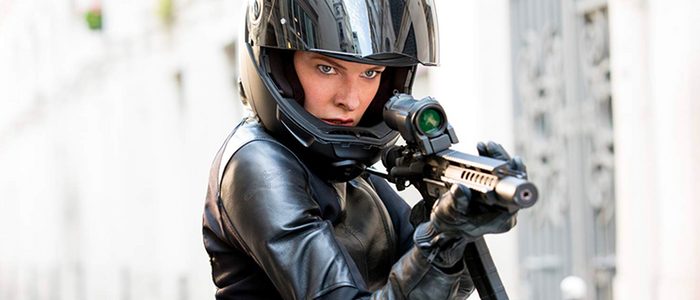
A Direct Sequel
Beyond the big, jaw-dropping action set pieces, Fallout does something very interesting: it rehabilitates Ethan Hunt. It takes steps back from the brink of his Rogue Nation character description, and goes down another path. Here is a film that finally tells us who Ethan Hunt is: he's someone willing to make a potentially bad choice to help the people he cares about. As IMF Chairman Alan Hunley (Alec Baldwin) says, Hunt is the type of spy who isn't willing to sacrifice one life to save thousands (or more). He's not a big picture person. He's focused on the smaller picture. Because in Hunt's view, saving one life is the same exact thing as saving thousands.It can get a bit heavy-handed. There are several scenes in Fallout where characters stop and give speeches about what a great guy Ethan Hunt is. It works in the context of the film, but one can't help realize it's all a bit self-serving. Because when you boil it down, Tom Cruise is Ethan Hunt. They're one in the same. And if everyone in the movie is giving speeches about what a swell fellow Ethan Hunt is, it's tantamount to the same characters singing the praises of Cruise – who produces this franchise.But can you blame them? Cruise is one of the last genuine movie stars, and the Mission franchise has given him the opportunity to seriously rehabilitate his image. Around the time of the release of War of the Worlds, Cruise's persona (and career) took a nosedive, due to some very questionable public appearances. Ever since then, he's been climbing his way back to the top, one dangerous stunt at a time. Through this series, Cruise has become both actor and stuntman, constantly putting his life in danger for the sake of entertainment. On one hand, it makes for good press – we all want to talk about how entertaining it is to watch Cruise risk certain death for the sake of an action movie. On the other hand, it really is genuinely thrilling. We're rightfully amazed as we watch Cruise leap from planes, or jump between buildings, or dangle from helicopters. All of this stuff could easily be faked with greenscreens and digital trickery. But it's really happening, and Cruise is really doing it, and gosh darn it, that's exciting.Fallout is the first Mission: Impossible film to serve as a direct sequel. And not just to Rogue Nation, either. Sure, all the Mission films exist within the same universe, but up until now, they've all been stand-alone stories. Fallout takes a much different approach. It's an explicit follow-up to the events in Rogue Nation, but more than that, it's a film that references the series as a whole. It's almost as if McQuarrie and Cruise are rewarding the franchise's fans. They're saying "Thank you" to everyone who stuck around for six movies, and proving that it was all worth it.Remember arms-dealer Max, from Mission: Impossible? Well, her daughter – who has the super cool nickname the White Widow – is in this film, played by Vanessa Kirby. Remember when Ethan Hunt did some rock climbing in Mission: Impossible 2? He gets to do that again here too. Ethan got hitched to very nice nurse Julia Meade (Michelle Monaghan) in Mission: Impossible III, and ever since then, the franchise has been trying to figure out what to do about that. Mission: Impossible – Ghost Protocol featured a fake-out where the audience was made to believe Julia had been killed, only to have her show up at the end. Rogue Nation didn't mention her at all. Here, McQuarrie's script finally gives Julia her due, and directly involves her in the film's big climax.At the end of Rogue Nation, Ethan Hunt and his team had seemingly foiled the Syndicate, a rogue organization comprised of secret agents from all over the world, fronted by unpleasant weirdo Solomon Lane (Sean Harris). Unlike other Mission baddies before, Lane survived the events of Rogue Nation, and ended up in custody. Now, Ethan Hunt is starting to think that might've been a mistake. His haunted by nightmares of Lane, and while the Syndicate has been wounded, it's not dead yet.The remaining members of the Syndicate are now calling themselves the Apostles, and they want to get their hands on some plutonium cores to build nuclear weapons. The Apostles don't just want to set off some bombs, though. They have a diabolical plan to throw the entire world into anarchy and chaos, with what they believe to be a noble goal. The Apostles believe that if everything is chaos, world powers will have no choice but to work together to fix things. It's pretty much the same exact plan that Ozymandias has in Watchmen, minus the giant fake squid-alien.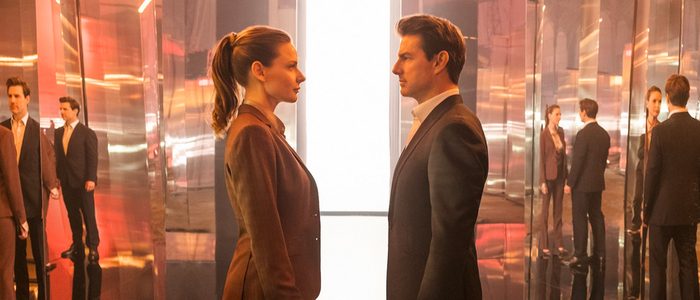
The Mission (Should You Choose to Accept It)
At Fallout's start, Ethan's commitment to caring about one life instead of thousands backfires. While posing as plutonium buyers, Hunt and his team – Ving Rhames as the ever-present Luther Stickell, and Simon Pegg as the nervous Benji Dunn – get made. Luther's life is in danger, and Ethan could just let Luther die in order to keep the plutonium safe and prevent possible nuclear annihilation. Instead, Ethan shoots Luther – who happens to be wearing a bulletproof vest. In the ensuing chaos, the Apostles make-off with the plutonium, and the IMF is once again under some heavy scrutiny from Washington (how this agency, which has been disavowed several times and is constantly being called out for recklessness, continues to operate is one of the film's biggest suspension-of-disbelief elements).Ethan is committed to tracking the plutonium down and stopping the Apostles. How? "We'll think of something," he says – a line that becomes Hunt's mantra in the film. He repeats it several times when pressed for an answer as to how he's going to solve a big problem.This answer isn't good enough for CIA chief Erica Sloan (Angela Bassett), who orders one of her agents – the very handsome, very mustachioed August Walker (Henry Cavill) – accompany Hunt on the mission. Hunt and Hunley don't like this idea, but they're stuck with it.Cavill is a delightful addition to the franchise. It's clear from the start (and from the trailers) that his character is going to turn out to be a villain, but the actor brings charisma mixed with brutality. If Ethan Hunt is a "scalpel", as Sloan calls him, Cavill's Walker is a "hammer." He barrels through scenes, fists at the ready. Cavill's work here is more proof of how terribly served he's been by the DCEU. After the triple threat of Man of Steel, Batman v Superman and Justice League, I was actually starting to suspect Cavill was just a poor actor. Instead, he just needs to be in a franchise that understands how to use him. Here, he's holding his own against Tom Freakin' Cruise, and that's saying something.After a thrilling HALO jump sequence, Hunt and Walker end up in Paris, which gives way to a big, brutal, and funny bathroom fight. If this all sounds like a lot of action at once, you haven't seen anything yet. Fallout never lets up, and McQuarrie knows exactly how to keep it all very thrilling. The action is clear and concise – there's never a moment where the camera shakes, or the image blurs, and we're left wondering what is going on. McQuarrie understands that he has to get it all in frame, and make it look real, or else what's the point? He approaches the big action beats like something from a Buster Keaton movie – it's thrilling, it's jaw-dropping, it's surprisingly amusing. This isn't dour brutality for the sake of brutality. There's a playfulness to Fallout's action.Hunt and Walker soon cross paths with Rogue Nation breakout character Ilsa Faust (Rebecca Ferguson). Ilsa was out of the game at the end of Rogue Nation, but as she tells Ethan, she could never really be out. Not as long as Solomon Lane is still alive. Her mission, should she choose to accept it: find Lane and kill him, and then she can finally go home.As fate would have it, Lane ends up playing a big part in the mission Ethan is on. After making contact with the alluring arms dealer the White Widow (a feisty but sadly underused Vanessa Kirby), Ethan, Walker, Luther and Benji get caught up in a scheme to bust Lane out of custody. I won't sugarcoat things here: this entire set-up is maddeningly convoluted, and even hard to keep track of. As wonderful as Fallout is, its plotting is not nearly as tight as it could be – especially compared to the airtight Rogue Nation.Part of the confusion is a deliberate obfuscation on McQuarrie's part. He's keeping things vague to disguise a twist. Several twists, actually. One is that Walker is one of the Apostles. The other is that Lane has practically orchestrated almost everything going on here in order to get revenge on Ethan Hunt. It doesn't even add up – just how has Lane, who has been shuffled around in custody from one government to the next – been able to put this very elaborate plan in action? It's best not to think about it.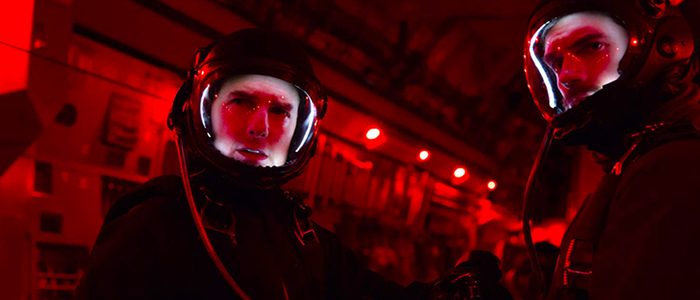
Non-Stop Action
Once Lane is sprung, Fallout really begins to motor, and any and all quibbles drop away. Except one: the use of Ilsa Faust. Ferguson was phenomenal in Rogue Nation, and when I heard she was coming back – another first for the franchise – I was thrilled. Yet Fallout has trouble balancing her with the bulk of the movie. Her reasoning for getting back into the spy game makes sense, but it seems a bit too tidy. And there's so much going on here that Ilsa was bound to have a smaller part than last time. But I wanted more. Paramount: get cracking on that Ilsa Faust spin-off movie. Hell, bring back all the other female team-members from the previous films – Paula Patton, Maggie Q – and have them assemble their own team with Ilsa as the leader.After trying (and failing) to catch Walker in the Tom Cruise Running Scene to end all Tom Cruise Running Scenes, Fallout rockets to its anxiety-inducing climax. Everyone ends up in Kashmir, where, wouldn't you know it, Ethan's ex-wife Julia is working as a nurse, with her new husband, the suspiciously nice Patrick, played by Wes Bentley. (Side-note: Patrick is so polite and understanding, played by Bentley with a perpetual grin, that I was convinced there was going to be a last-minute twist where it turns out he's been secretly working for Lane the whole time. But no, Patrick is just a really nice guy, I guess.)This is all part of Lane's plan. He's going to set off his nukes, kill Julia and also contaminate the water supply to India, Pakistan, and China – an event that will ultimately starve a third of the world's population. How's Ethan going to stop this one?! He'll think of something.That "something" is the most exhilarating sequence in Mission history. Not just one action scene, but several, all intercut – thunderous applause needs to be directed at editor Eddie Hamilton, who, along with McQuarrie, manages to make what could've easily been a confusing, muddled mess into a crystal clear sequence in which we know where everyone is, at every single second:
This is a lot of balls to keep up in the air, and it could've backfired. If just one of these events lagged, or failed to entertain, the result could be a lopsided sequence in which we're cutting from a thrilling moment to a less-than-thrilling one. But McQuarrie keeps it all equally engaging, and tense, and funny. There's something inherently hilarious about watching Tom Cruise fly a helicopter, clearly unsure about what the hell he's doing.It culminates in a crash sequence, and then a fist-fight, and then a moment where Hunt and Walker are both dangling over the side of a cliff. I have to pause here to highlight how brilliantly McQuarrie plays the audience here. The important item in this scene is the detonator, and it keeps getting kicked around, dangerously close to the edge. The audience I saw the film with collectively lost their minds during this sequence, groaning in fear and delight at what was going on. They were hooked, wholly committed to what they were witnessing. It made the scene even better.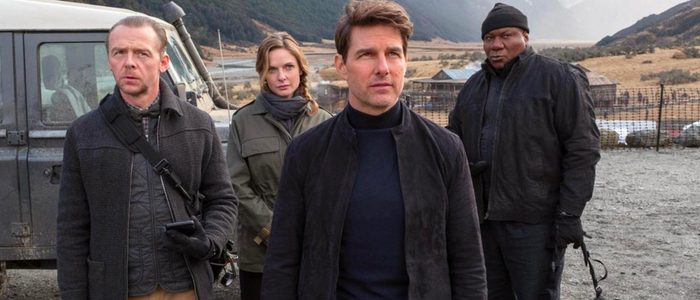
Character Work
This is a spoiler review, but you know how this all ends, even if you haven't seen the film. Ethan and his team triumph. Walker dies. Lane inexplicably survives (What's that about? There's no way he's coming back a third time, is he?). The bomb is very close to going off, and Ethan stops it with only seconds to spare. "How close were we?" his team asks later. "The usual," he says, exhausted.There's an unexpected catharsis in the conclusion of Mission: Impossible – Fallout. McQuarrie can stage an action set-piece – and then some – but he also understands that he has to focus on character as well. Those action scenes wouldn't work nearly as well if we didn't give a shit about the people taking part in them.Ving Rhames is always a welcome presence – other than Cruise, he's the only actor to stick with the entire franchise – but his Luther Stickell has been a bit sidelined for a good portion of the franchise. He shows up, he cracks a few jokes, he looks at computer screens. Rhames is a pro, so he makes all of that work, but Fallout gives him more. First, he gets a surprisingly emotional moment with Ilsa in which he begs her to walk away, because he knows Ethan cares about her more than he wants to admit. Rhames' acting here – he remains almost inhumanly still, and brings his extremely deep voice down to a whisper – is hypnotic. We hang on his every word. Later, Luther gets to share a moment with Julia as they work together to disarm the bomb. It was a blast seeing Luther doing stuff – not just sitting in a van watching a monitor.And speaking of Julia, how nice it was to have her – and Michelle Monaghan – back. Ethan's marriage to Julia in Mission: Impossible III was never going to work. You can't have Ethan Hunt as a happily married man while he's running around doing dangerous stuff. The franchise could've simply forgotten Julia – killed her off, or never mentioned her again. But McQuarrie's script brings her back, and gives her something to do. She's not a damsel in distress; she's not a victim. She's right there, in the trenches, trying like hell to stop that bomb. The moment is slightly spoiled by a big emotional speech she gives Ethan at the end where she essentially says, "I'm the woman I am today because of you, Ethan Hunt, most wonderful man on the planet!" It again seems like producer Cruise is patting himself on the back a bit too much.Monaghan is one of those inherently likable, utterly charming actors, so much so that I still remain shocked she's not a superstar. She's not a complete unknown, of course, but it seems like her career should be bigger for how gifted she is. Nonetheless, she takes a very small part and turns it into something special here.If any team member is short-changed here, it's Pegg's Benji. He remains an indispensable member of the team, and always brings a bit of nervous-yet-funny relief to tense moments. But Benji doesn't have a whole lot to do here – although he does finally get to wear a mask – something he badly wanted to do in Rogue Nation – and he also takes part in a shockingly brutal fight sequence with Solomon Lane. In my extremely wordy retrospective on the franchise as a whole (read it here!), I commented that outside of Philip Seymour Hoffman's spectacularly scary baddie in M:I III, the Impossible franchise hasn't really had memorable villains. Lane came closest in Rogue Nation, and here he surpasses that. Sean Harris' work here isn't quite as good as Hoffman's (let's face – very few actors are as good as Hoffman was) – but the actor really sinks his teeth into the role this time. Lane was a bit aloof in Rogue Nation – a guy with glasses and a permanent scowl. Here, he's terrifying, boiling with rage at Ethan and his team. The climactic sequence that pits Lane against Ilsa and Benji is so jarringly nasty that it caught me off-guard – we can feel Lane's brutality in the moment, and we so badly want Ilsa to kick his ass and put a stop to all of this.All's well that ends well, though. Ethan saves the day, he and his team share a laugh, Lane is handed over to MI6. All is right. Oh, except for Hunley. He died. It'll be a shame to lose Baldwin – he felt like he was just getting started with the series – but it'll be interesting to see who takes his place. Which brings me to one final question.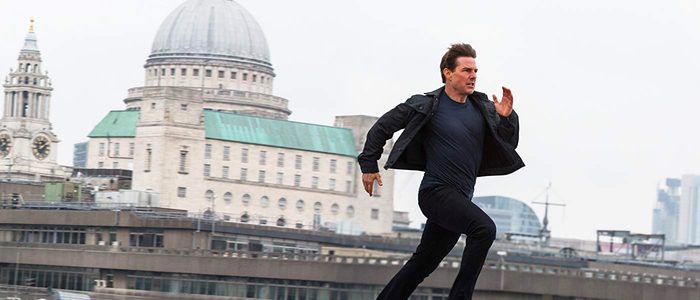
Where Does the Franchise Go From Here?
Mission: Impossible has become the very-best action franchise around right now, and really one of the best franchises of all time. Cruise and company have built a legacy, with one film after another improving on the last. At 56 (I had to double-check to make sure that was right), Cruise shows no signs of slowing-down. Fallout had the biggest box office opening of the franchise to date. A new Mission is inevitable.But what direction will it go? Fallout has put the series in an interesting place. Up until now, one of Mission: Impossible's greatest assets was its ever-changing directors. Each new film brought on a new director, who then brought something new to the series. Fallout is the first film to carry a director over. And while McQuarrie deliberately changed crews from Rogue Nation and Fallout to make it seem different, one can't help but wonder if he'll be coming back for the next entry.A part of me wants someone new and exciting to step in. But McQuarrie has become so good at this – his direction here is astoundingly assured – that it would feel wrong to see him go. On that note, does the next entry follow in the footsteps of this film, and continue to be a direct sequel, or does it start fresh all over again? I sure as hell want more Ilsa Faust (although please, do not make her and Ethan lovers; they work much better as colleagues), and I definitely want more of Kirby's White Widow, which more or less confirms that I want the next film to be more of a direct follow-up.And yet, another big strength of the franchise has been its ability to adapt and do something different each time. For each sequel to stand on its own. Time will tell what happens. In the end, as long as Tom Cruise keeps running, I'll be watching. As long as the missions are there, I'll choose to accept them. But good lord, how do you top the action and excitement Fallout without giving audience members actual heart attacks?
